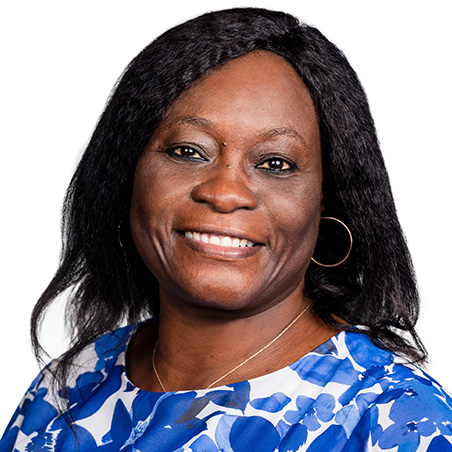Perseverance Leads to Arcadia’s First National Institutes of Health Research Enhancement Award
Dr. Comfort Z. Olorunsaiye will use the grant to study the perceptions, beliefs, norms, and fertility preferences that influence birth spacing among African immigrants in the United States

If at first you don’t succeed, try, try again. This is the lesson that Dr. Comfort Z. Olorunsaiye, associate professor of Public Health, learned when applying for her recently awarded National Institutes of Health (NIH) R15 grant.
“I submitted this grant application in February 2022,” Olorunsaiye said. “It was reviewed, but not funded. So I revised and resubmitted the application in February of 2023. Again, it wasn’t funded, which was frustrating, but my impact score had improved significantly. I finally decided to give it a go for the third time, and in October of last year, I submitted again, making sure that I addressed every comment from the reviewers. Ultimately, it was reviewed within the score range for funding and was awarded last month.”
The $385,936, three-year award will fund Olorunsaiye’s project, “Developing and testing a measure of sociocultural norms related to interpregnancy intervals in African immigrants in the US.” In the first of two phases, Olorunsaiye and her colleagues will work with a community liaison from the African Family Health Organization in Philadelphia and a community advisory board to identify participants and carry out study activities. The participants will be immigrant women and men from Sierra Leone, Liberia, Ghana, and Nigeria.
Olorunsaiye will also recruit students to work on the project during the first and second phases.
“A focus of the grant that I received is to help strengthen university infrastructure for research, and also to strengthen the research environment for students,” she said. “So, I have a plan to involve a total of 12 students over the three-year project, two undergraduate and two graduate students per year. The undergraduate students are going to be advanced undergraduate students that have completed introductory courses. Preferably, the graduate students will be in our MPH program. They will be participating in all aspects of the study.”
After identifying the study participants and the students that will help with the research, phase one will conclude with the research team interviewing participants about their perceptions, beliefs, fertility preferences, and practices related to birth spacing. The team hopes to speak with 10 women from each of the four countries who have had at least two children so that they get a good sense of the factors related to the intervals between births. Researchers will also speak with men born in these four countries because, many times, reproductive health and fertility decisions are driven by the male.
The second phase will be quantitative. Olorunsaiye and her research team–which also includes Dr. Michael Morrow, professor of Counseling at Arcadia–will use the data they collected throughout the interview process to develop and validate a measurement scale for assessing the attitudes, practices, and beliefs related to pregnancy intervals.
Olorunsaiye tenaciously pursued the grant funding because of the impact of adverse maternal and infant outcomes resulting from short-interval pregnancies.
“Since 2000, the proportion of African immigrants in the Philadelphia area has grown more than two-fold. Despite the rapid growth in African immigration, the population remains grossly underrepresented in immigrant health outcomes research, including reproductive health outcomes,” Olorunsaiye said. “Nearly one-half of this population is married or in a marital union; therefore, understanding their fertility intentions is vital.”
NIH R15 grants support small-scale research projects at educational institutions that provide baccalaureate or advanced degrees for a significant number of the nation’s research scientists but that have not been major recipients of NIH support.
“Within Arcadia, I had a lot of support from the Office of Sponsored Research and Programs,” Olorunsaiye said. “For my first submission, OSRP actually engaged an external consultant to review my grant application before submission, which was extremely helpful.”
“I also received a lot of support from my colleagues,” Olorunsaiye continued. “They were all really helpful with directing me to different resources and in other various ways, with the understanding that this is not their research field.”
This project will build off of research that Olorunsaiye conducted through 2021 and 2022, for which she received a 2020 Changemakers in Family Planning grant from the Society of Family Planning.
###
*Research reported in this publication was supported by the Eunice Kennedy Shriver National Institute Of Child Health & Human Development of the National Institutes of Health under Award Number 1R15HD116088-01. The content is solely the responsibility of the authors and does not necessarily represent the official views of the National Institutes of Health.


